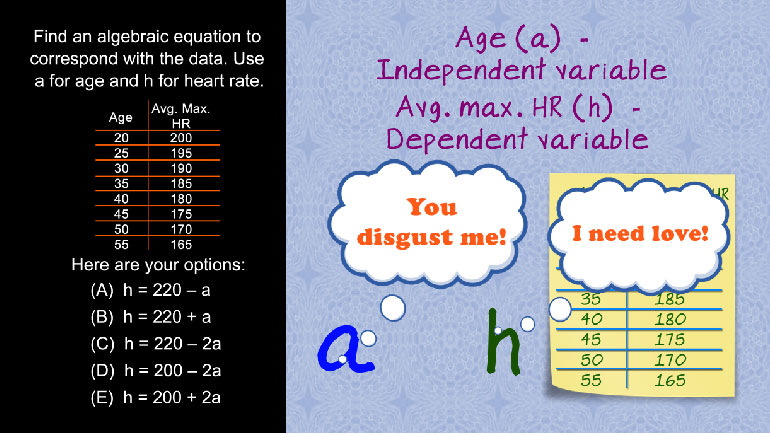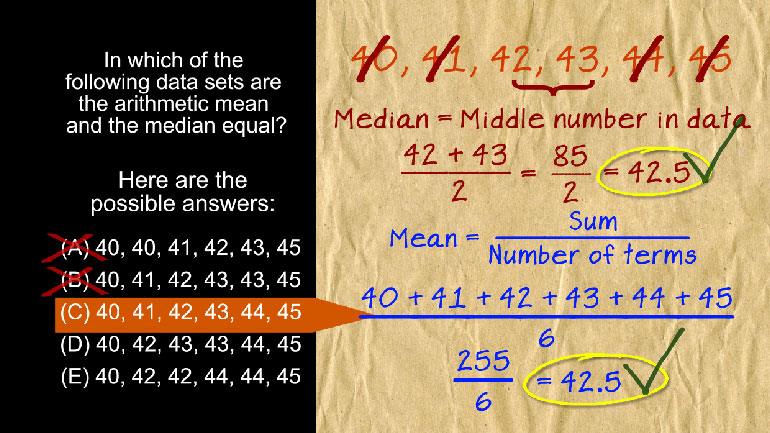ShmoopTube
Where Monty Python meets your 10th grade teacher.
Search Thousands of Shmoop Videos
Drawing Conclusions from Context for a Given Linear Function 4 Views
Share It!
Description:
In a laboratory experiment, heating the contents of a closed, sealed, and inelastic vessel increases the pressure caused by gas within the vessel at a constant rate. The increase is modeled by the equation above, where P is the pressure of gas in the vessel given in atmospheric units (atm) and T is the temperature in Kelvin. Based on this equation, which of the following is true?
Transcript
- 00:03
Okay s eighty match members Four of five here in
- 00:06
this section Just tryingto divine what these equations mean Alright
- 00:10
here's Another point Nine p is t after excrement heating
- 00:13
the contents of closed sealed and any lasting vessel increases
- 00:15
pressure caused by gas with universal at a constant rate
Full Transcript
- 00:17
increases model But about what if he is a pressure
- 00:19
vessel given an atmospheric unit or and t is the
- 00:20
time for being killed in the same situation with a
- 00:22
bone through all right people what time is it Yes
- 00:26
it's science time Aren't you happy Everyone has their safety
- 00:29
gloves and goggles on right Right Let's turn the heat
- 00:32
on and get this experiment started This problem deals with
- 00:34
independent and dependent variables Will independent variables represent what is
- 00:39
being controlled the x value And here we can control
- 00:42
the increase in temperature Got it We're gonna crank up
- 00:45
the eggs Dependent variables represent the y value So as
- 00:49
we turn act why will change Yeah That's The y
- 00:51
values its value That depends on the x value or
- 00:55
response to the changes that the scientists makes to the
- 00:57
temperature of the vessel in this instance will have a
- 01:00
corresponding pressure change in response to an increase in temperature
- 01:03
and the variable being controlled here is the temperature tea
- 01:06
because it is said that the pressure depends on the
- 01:09
heat Like we get that right in the problem This
- 01:12
problem can be translated to slope intercept form quickly that
- 01:15
y equals mx plus b thing T is the x
- 01:19
value P is the y value and find the slope
- 01:22
intercept form of a line We need to isolate the
- 01:24
y value or in this case p so let's go
- 01:27
back the original equation zero point nine p s t
- 01:29
p equals one point one t because see we divide
- 01:32
both sides by point nine there plug in two equals
- 01:34
one and p equals one point one Well t equals
- 01:38
two yields P equals two point two So the pressure
- 01:41
increases by one point One atm for everyone Kelvin Increase
- 01:45
in temperature Right One degree kelvin goes up and the
- 01:48
pressure goes up a little bit more than one fun
- 01:51
fact This is the reason aerosol cans can birth when
- 01:54
heated up Increasing the heat inside of them increases their
- 01:57
pressure which gets dangerous when dealing with a sealed vessel
- 02:00
There that extra pressure has to go somewhere even if
- 02:03
it's through the walls of the metal cans So you
- 02:05
don't leave those open in your car in texas and 00:02:07.975 --> [endTime] some home
Up Next
SAT Math 1.1 Algebra and Functions. Find an algebraic equation to correspond with the data.
Related Videos
SAT Math 1.1 Geometry and Measurement. What is the circumference of the circle?
SAT Math 1.1 Numbers and Operations. How many combinations of beverage and cereal can be made?
SAT Math 1.1 Statistics and Probability. In which of the following data sets are the arithmetic mean and the median equal?
SAT Math: Algebra and Functions Drill 1, Problem 2. Based on the data in the table, what is the maximum heart rate for the average 22-year-old?




